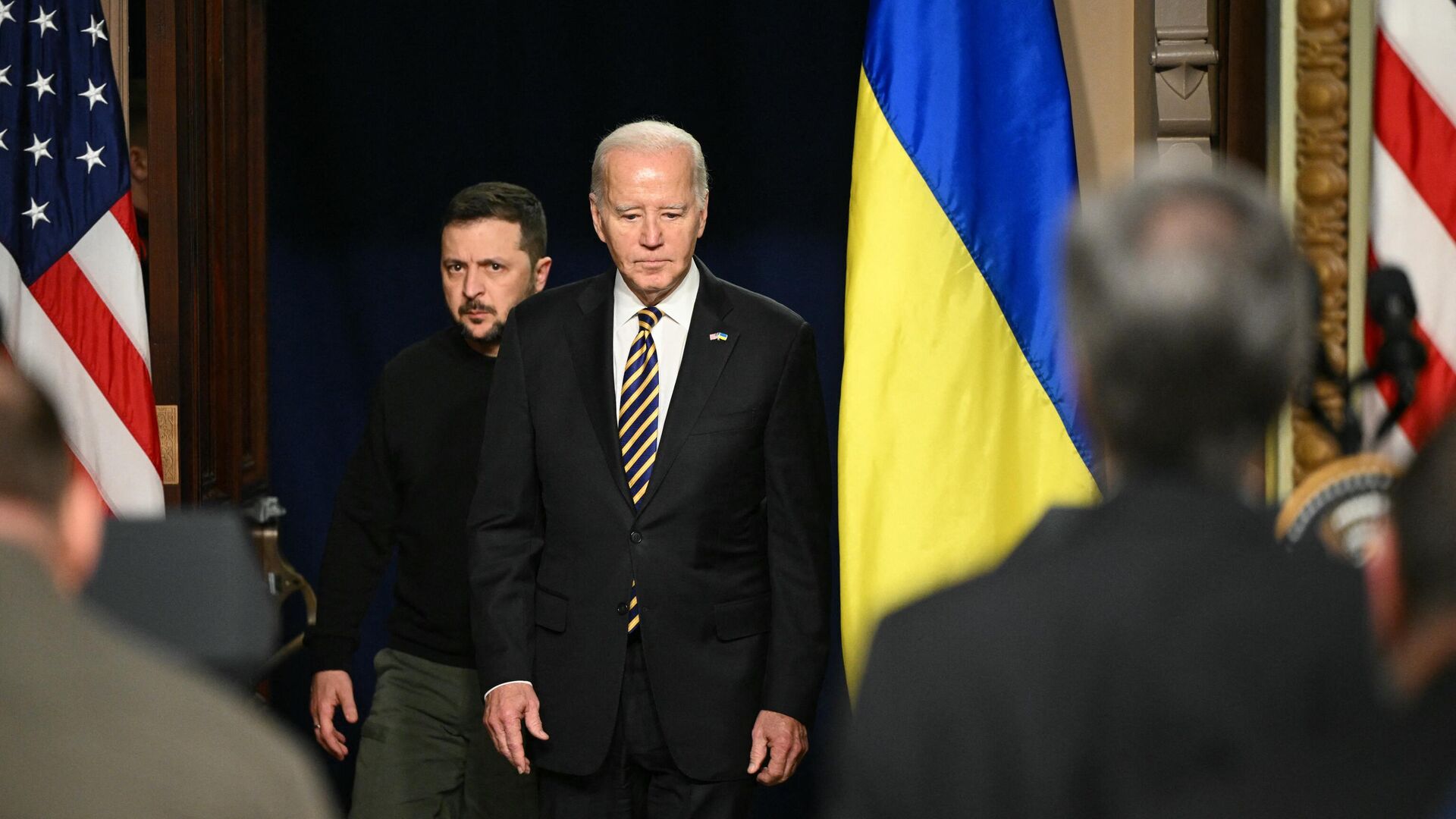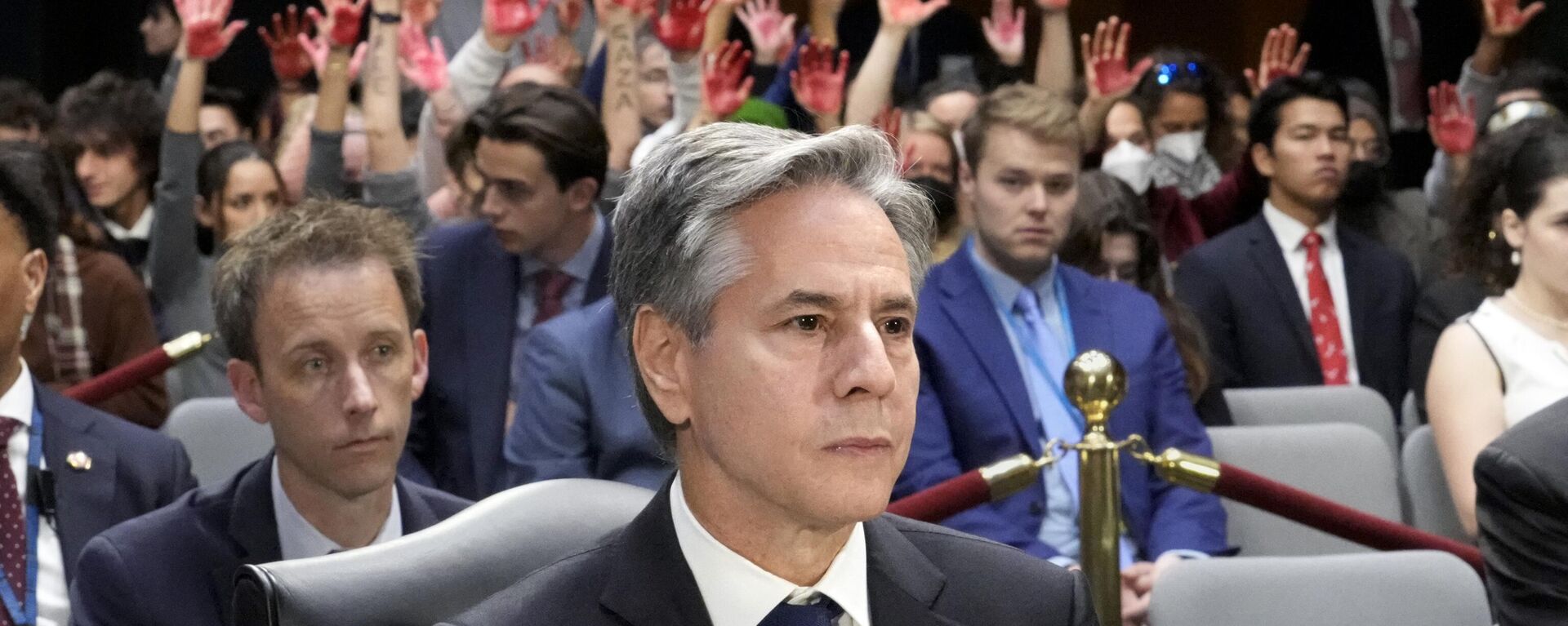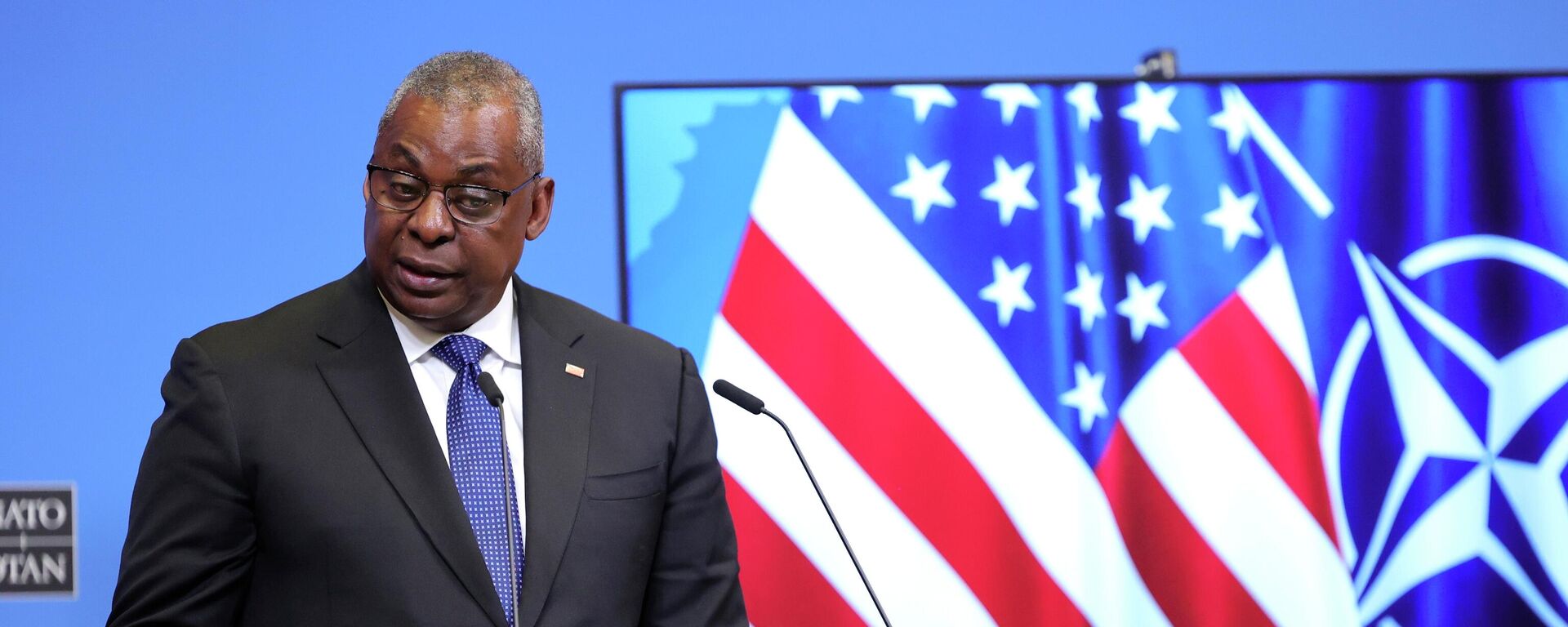https://sputnikglobe.com/20240429/ukraines-push-for-security-pact-with-us-foreshadows-looming-military-collapse---analyst-1118170362.html
Ukraine’s Push for Security Pact With US Foreshadows 'Looming Military Collapse' - Ex-US DoD Analyst
Ukraine’s Push for Security Pact With US Foreshadows 'Looming Military Collapse' - Ex-US DoD Analyst
Sputnik International
If Ukraine were not “within six months of military collapse,” it would have little concern to push for a long-term security agreement with the US, David Pyne, ex-Pentagon analyst, told Sputnik.
2024-04-29T07:56+0000
2024-04-29T07:56+0000
2024-04-29T11:24+0000
analysis
ukraine
security agreement
us
volodymyr zelensky
joe biden
donald trump
nato
nato membership
membership action plan
https://cdn1.img.sputnikglobe.com/img/07e8/04/1d/1118169988_0:160:3072:1888_1920x0_80_0_0_f03729f36a33e6abf0c7fd5cb65c8dfd.jpg
If Ukraine were not “within six months of military collapse,” it would have little concern to push for a long-term security agreement with the US, David Pyne, former US Department of Defense analyst and executive vice president of Task Force on National and Homeland Security, told Sputnik.He suggested that Kiev’s eagerness to negotiate the text of such a deal with Washington right now was a “good sign.”Zelensky announced on Sunday that Ukraine and the US are working on a bilateral security agreement that would include financial, political, and arms support, as well as joint weapons production.“We are already working on a specific text… We are discussing the specific foundations of our security and cooperation. We are also working on fixing specific levels of support for this year and the next 10 years," Zelensky said in a video address.According to the ex-Pentagon analyst, the purpose of the agreement being finalized in such a hurry is “to provide Ukraine with the security assurances it feels it needs to conclude a negotiated agreement” ending the ongoing conflict with Russia. The security guarantee is similar to the ones Ukraine has already signed with the UK, France, and Germany, he added. But there is also another aspect to the bilateral security pact currently in the works, the pundit said.Pyne recalled how bitter Zelensky was about being told that Ukraine would not be given a timetable or Membership Action Plan for accession to NATO.Washington is currently hoping that any negotiated peace agreement to end the hostilities that might occur “would not require Ukraine to cease its military cooperation with NATO, including training, bases and joint exercises even if Ukraine were to agree to a 10-year moratorium on NATO membership,” Pyne added.Essentially, the security agreement being fleshed out between Ukraine and the US is very similar to the ones that Washington has with Israel or Taiwan, David Pyne noted.Such a pact would presuppose the US continuing to do what it has been doing since the Ukraine conflict escalated: supplying military assistance to Kiev, training Ukrainian troops, intelligence sharing, etc., Pyne believed. In addition, the agreement would provide US support to further develop Ukraine’s military industrial base. In fact, one of the reasons the negotiated agreement is to be a 10-year one is because some in the West believe that the US would be open to allowing Ukraine to agree to a 10-year moratorium on NATO membership in exchange for peace, Pyne said.However, what the US will not agree to is "anything that would appear to bind it to send combat troops to Ukraine," the analyst stressed.Weighing in on what Ukraine might offer the United States to persuade it to sign an agreement that, as Zelensky put it, would be “the strongest of all," David Pyne said:Amid Ukraine's battlefield failures and acute manpower shortages, Biden just signed into law legislation with approximately $61 billion in Ukraine-related funding. The US is compelled to further bankroll Kiev for several reasons, underscored Pyne.The Biden administration wants Ukraine to continue in its current status as a de facto NATO member, he pointed out. He recalled that contrary to the Western-driven narrative, the proxy conflict in Ukraine started as a result of the US "expanding its sphere of influence into Ukraine from 2014 onward, which Russia considered to be an integral part of its historic territory." Overall, Washington's long-term geopolitical strategy regarding Ukraine boils down to “retaining Ukraine as a US protectorate, and a key part of their failed strategy of liberal hegemony,” David Pyne concluded.
https://sputnikglobe.com/20240406/natos-losing-war-and-an-empty-promise-to-ukraine--1117773465.html
https://sputnikglobe.com/20240409/us-defense-secretary-acknowledges-admitting-ukraine-in-nato-threatens-russian-security-1117836272.html
ukraine
Sputnik International
feedback@sputniknews.com
+74956456601
MIA „Rosiya Segodnya“
2024
News
en_EN
Sputnik International
feedback@sputniknews.com
+74956456601
MIA „Rosiya Segodnya“
Sputnik International
feedback@sputniknews.com
+74956456601
MIA „Rosiya Segodnya“
nato, ukraine, analysis, nato presence in ukraine, ukraine nato, nato strategy for ukraine, jens stoltenberg ukraine, politics, will ukraine join nato, will nato admit ukraine, nato is a part of ukrainian prozy war, russian special military operation
nato, ukraine, analysis, nato presence in ukraine, ukraine nato, nato strategy for ukraine, jens stoltenberg ukraine, politics, will ukraine join nato, will nato admit ukraine, nato is a part of ukrainian prozy war, russian special military operation
Ukraine’s Push for Security Pact With US Foreshadows 'Looming Military Collapse' - Ex-US DoD Analyst
07:56 GMT 29.04.2024 (Updated: 11:24 GMT 29.04.2024) After US President Joe Biden signed into law a $61 billion aid package for the Kiev regime earlier in the week, Ukraine’s Volodymyr Zelensky announced on Sunday that Kiev and Washington were working on a long-term bilateral security agreement. Kiev has already signed a number of 10-year security agreements with NATO countries.
If Ukraine were not “within six months of military collapse,” it would have little concern to push for a long-term security agreement with the US, David Pyne, former US Department of Defense analyst and executive vice president of Task Force on National and Homeland Security, told Sputnik.
He suggested that Kiev’s eagerness to negotiate the text of such a deal with Washington right now was a “good sign.”
“It means that Ukraine understands it is reaching the point when it will have no choice but to negotiate a permanent cease fire and peace agreement with Russia,” Pyne said.
Zelensky announced on Sunday that Ukraine and the US are working on a bilateral security agreement that would include financial, political, and arms support, as well as joint weapons production.
“We are already working on a specific text… We are discussing the specific foundations of our security and cooperation. We are also working on fixing specific levels of support for this year and the next 10 years," Zelensky said in a video address.
“Of course, the other reason this agreement is being pursued right now is that Zelensky fears that if [former] President Trump wins the 2024 presidential election, then he may opt to cut off all support for Ukraine and Zelensky wants to lock in this security agreement to try to pressure Trump to continue supporting Ukraine if Biden is defeated,” David Pyne contended.
According to the ex-Pentagon analyst, the purpose of the agreement being finalized in such a hurry is “to provide Ukraine with the security assurances it feels it needs to conclude a negotiated agreement” ending the ongoing conflict with Russia. The security guarantee is similar to the ones Ukraine has already signed with the UK, France, and Germany, he added.
But there is also another aspect to the bilateral security pact currently in the works, the pundit said.
“It is in fact meant to substitute for Ukrainian NATO membership which the US told Ukraine privately in no uncertain terms will not occur at the July 2024 NATO Summit in Vilnius, if ever,” the expert stated.
Pyne recalled how bitter Zelensky was about being told that Ukraine would not be given a timetable or Membership Action Plan for
accession to NATO.“All the talk by the US of Ukraine joining NATO in the near future is a complete and total facade. The only purpose of dangling potential future NATO membership for Ukraine is to try to keep it firmly in the Western camp and prevent it from attempting to seek security assurances from Russia instead,” he emphasized.
Washington is currently hoping that any negotiated peace agreement to end the hostilities that might occur “would not require Ukraine to cease its military cooperation with NATO, including training, bases and joint exercises even if Ukraine were to agree to a 10-year moratorium on NATO membership,” Pyne added.
Ukraine applied for accelerated NATO membership in September 2022. However, despite the bloc’s enlargement being in high gear for decades, with Finland and Sweden recently being absorbed into the military alliance, it has shied away from approving Kiev’s application. Moscow has long warned that NATO’s sweeping post-Cold War expansion in violation of the West's commitment to not move any closer to Russia’s borders creates threats to the country’s security.
Essentially, the security agreement being fleshed out between Ukraine and the US is very similar to the ones that Washington has with Israel or Taiwan, David Pyne noted.
Such a pact would presuppose the US continuing to do what it has been doing since the Ukraine conflict escalated: supplying military assistance to Kiev, training Ukrainian troops, intelligence sharing, etc., Pyne believed. In addition, the agreement would provide US support to further develop Ukraine’s military industrial base. In fact, one of the reasons the negotiated agreement is to be a 10-year one is because some in the West believe that the US would be open to allowing Ukraine to agree to a 10-year moratorium on NATO membership in exchange for peace, Pyne said.
However, what the US will not agree to is "anything that would appear to bind it to send combat troops to Ukraine," the analyst stressed.
Weighing in on what Ukraine might offer the United States to persuade it to sign an agreement that, as Zelensky put it, would be “the strongest of all," David Pyne said:
“I think the Biden administration is open to signing such an agreement with an unwritten and implied condition that Ukraine does not agree to the main Russian demand of permanent neutrality outside of NATO. The administration has refused to provide security guarantees for Ukraine’s neutrality. Of course, Ukraine may not have a choice as, following a major Russian offensive, it may be forced to agree to Russia’s peace terms whether the US likes them or not.”
Amid Ukraine's
battlefield failures and acute manpower shortages, Biden just signed into law legislation with approximately
$61 billion in Ukraine-related funding. The US is compelled to further bankroll Kiev for several reasons, underscored Pyne.
The Biden administration wants Ukraine to continue in its current status as a
de facto NATO member, he pointed out. He recalled that contrary to the Western-driven narrative, the
proxy conflict in Ukraine started as a result of the US "
expanding its sphere of influence into Ukraine from 2014 onward, which Russia considered to be an integral part of its historic territory."
Moscow has repeatedly underscored that one of the reasons for Russia's special military operation in Ukraine was the latter's enshrining its Euro-Atlantic aspirations in its constitution. Russian President Vladimir Putin has said that NATO's expansion to include Ukraine would create a direct national security threat to Russia and that Moscow considers the non-aligned status of Ukraine to be extremely important.
"For both sides, territorial gains or losses are of much lesser consequence than whether Ukraine will remain under the US military sphere of influence or return to its pre-war February 2014 Maidan coup status as a permanently neutral buffer state between Russia and NATO. Accordingly, the Biden administration is willing to pay for Ukraine’s defense requirements for a decade following the negotiation of a peace settlement with Russia to maintain US domination over Ukraine,” Pyne stated.
Overall, Washington's long-term geopolitical strategy regarding Ukraine boils down to “retaining Ukraine as a US protectorate, and a key part of their failed strategy of liberal hegemony,” David Pyne concluded.






